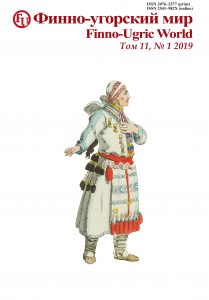N. S. Bratchikova (Moscow, Russia). The use of plural form of the noun in the Finnish language
M. V. Mosin, N. M. Mosina (Saransk, Russia). Vowels of the end of Finno-Ugric word basis in the Mordovian languages
G. L. Nakhracheva (Khanty-Mansiysk, Russia). A verb as a reflection of the main characteristics of human behavior in the Khanty language
HISTORICAL STUDIES
T. V. Voldina (Khanty-Mansiysk, Russia). The symbolic significance of bone, stone and metal in the context of traditional views of the Ob Ugrians on reincarnation
E. N. Kasarkina (Saransk, Russia). Subculture of family-related assistance to the Mordovian young family in the countryside
T. V. Pashkova (Petrozavodsk, Russia). Etiology and methods of treatment of toothache in traditional medicine of Karelians
S. A. Tambi (Moscow, Russia). Estonians on the Vasilyevsky Island Of Saint Petersburg
B. I. Chibisov (Tver, Russia). Ethnic structure of Zaonezhie population at the end of the XV Century
CULTURAL STUDIES
S. V. Gavin, Z. A. Tanshina (Moscow, Russia). Tapestry art in Mordovia today
V. P. Minichkina, E. S. Rus’kina (Saransk, Russia). Epos as a factor of formation of ethnic identity of a personality (on the example of Republic of Mordovia)
EVENTS, PEOPLE, BOOKS
V. I. Rogachev (Saransk, Russia). A. S. Lusgin, an ethnographer, an expert in Finno-Ugric studies, and a public figure (on the 70th birth anniversary)
V. N. Maksimov, N. N. Glukhova (Yoshkar-Ola, Russia). Aleksandr Efimovich Kitikov – 90
S. P. Gudkova (Saransk, Russia). The book of poems as a large genre form in modern poetry of Mordovia
L. V. Brazhnik (Kazan, Russia). Finno-ugric ethnomusicology: encyclopedia of historical knowledge























